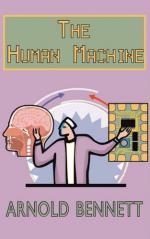it, and I can’t!’ How have you tried to
stop it? ’Well, I’ve made up my mind
several times to fight against it, but I never succeed.
This is strictly between ourselves. I don’t
usually admit that I’m a grumbler.’
Considering that you grumble for about an hour and
a half every day of your life, it was sanguine, my
dear sir, to expect to cure such a habit by means
of a solitary intention, formed at intervals in the
brain and then forgotten. No! You must do
more than that. If you will daily fix your brain
firmly for half an hour on the truth (you know it to
be a truth) that grumbling is absurd and futile, your
brain will henceforward begin to form a habit in that
direction; it will begin to be moulded to the idea
that grumbling is absurd and futile. In odd moments,
when it isn’t thinking of anything in particular,
it will suddenly remember that grumbling is absurd
and futile. When you sit down to the meal and
open your mouth to say: ‘I can’t
think what my ass of a partner means by—’
it will remember that grumbling is absurd and futile,
and will alter the arrangement of your throat, teeth,
and tongue, so that you will say: ‘What
fine weather we’re having!’ In brief, it
will remember involuntarily, by a new habit.
All who look into their experience will admit that
the failure to replace old habits by new ones is due
to the fact that at the critical moment the brain
does not remember; it simply forgets. The practice
of concentration will cure that. All depends on
regular concentration. This grumbling is an instance,
though chosen not quite at hazard.
VI
LORD OVER THE NODDLE
Having proved by personal experiment the truth of
the first of the two great principles which concern
the human machine—namely, that the brain
is a servant, not a master, and can be controlled—we
may now come to the second. The second is more
fundamental than the first, but it can be of no use
until the first is understood and put into practice.
The human machine is an apparatus of brain and muscle
for enabling the Ego to develop freely in the universe
by which it is surrounded, without friction.
Its function is to convert the facts of the universe
to the best advantage of the Ego. The facts of
the universe are the material with which it is its
business to deal—not the facts of an ideal
universe, but the facts of this universe. Hence,
when friction occurs, when the facts of the universe
cease to be of advantage to the Ego, the fault is
in the machine. It is not the solar system that
has gone wrong, but the human machine. Second
great principle, therefore: ’In case
of friction, the machine is always at fault.’




